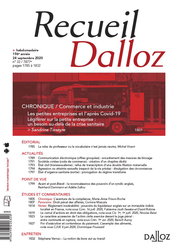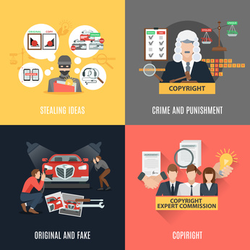The recent news
Sept. 27, 2020
Interviews

Référence complète : Frison-Roche, M.-A., "Plus le monde est dérégulé, et plus on a besoin de régulation", Journal du Dimanche - JDD, 27 septembre 2020.
Les questions étaient les suivantes :
Comment définissez-vous les professions réglementées?
Un "titre" y est apposé sur les personnes, avocat, dentiste, notaire, etc. Ça fonctionne comme un certificat. Comme en finance – produits financiers "certifiés" – ou dans l'alimentation – aliments "certifiés" –, ce titre est un gage de traçabilité : il crédite aux yeux de tous la personne d'une compétence qu'il n'est a priori pas nécessaire de vérifier. Ces professions structurées sont des piliers de la vie économique et sociale car les accréditeurs [autorités publiques ou instances professionnelles] garantissent l'indépendance et le dévouement du professionnel. Ainsi l'adjectif "réglementées" parvient sans doute mal à définir à lui seul ces professions. Je parlerais plutôt de "professions publiquement structurées".
Est-ce un système qui a de l'avenir?
Oui, très grand ! Dans un monde ouvert qui cherche ses repères et sa stabilité, les professions réglementées, parce qu'elles sont structurées et structurantes, seront essentielles. Ainsi, plus le monde est dérégulé, plus on a besoin de régulation ! Le paradoxe n'est qu'apparent. Il faut arrêter d'opposer marché et État. Moins il y a de réglementations fixes, plus on a besoin de repères. Par exemple, j'arrive dans un pays étranger et j'ai un problème de droit : mon premier réflexe sera de trouver un avocat, en qui j'aurai confiance du fait de son titre, qui valide a priori ses compétences et son intégrité.
Les professions réglementées ont été attaquées, presque cernées, par le droit de la concurrence
Nous vivons visiblement le contraire, avec l'explosion de sites d'avis et de conseils…
Justement, voilà la question de la source, de savoir qui certifie : ici ce sont les clients ou des amis des clients, il n'y a plus de distinction entre le certificateur et l'utilisateur. Cette absence de distance produit une capture et la perte catastrophique d'une exigence clé de tout système évolué : l'impartialité et l'indépendance de celui qui juge.
Comment les professions réglementées ont-elles évolué ces dernières années?
Elles ont été attaquées, presque cernées, par le droit de la concurrence. La direction de la concurrence de la Commission européenne ou l'Autorité de la concurrence en France tenaient le raisonnement suivant : les diplômes spécifiques exigés et les structures professionnelles verrouillent le secteur, il faut l'aérer. Ce droit conçoit la régulation comme une transition vers la concurrence et non comme un équilibre entre concurrence et, par exemple, le souci de la personne. Les professions dites "réglementées" sont au contraire structurées pour maintenir cet équilibre entre le dynamisme de la concurrence et l'humanisme du droit. Sur ce point, avocats et notaires doivent unir leurs forces.
Quelle vision avez-vous de la réforme Macron, entamée il y a cinq ans?
Elle est allée dans le sens de la concurrence, mais avec en filigrane une perspective de régulation définitive et non une transition avec un marché du droit pur et simple. Les instances de la concurrence conçoivent sans doute la société à travers le seul prisme du marché concurrentiel, mais l'Europe s'en détache de plus en plus. Il y a aujourd'hui l'ambition de construire une Europe souveraine qui ne peut pas être simplement concurrentielle. Les professions réglementées ont en ce sens un rôle essentiel à jouer, notamment par l'accélération de leur transition numérique, souhaitée pour les avocats et par le rapport Perben, et mise en oeuvre par les notaires.
Sept. 24, 2020
Publications : Chronicles MAFR - Compliance Law

►Référence complète : M.A. Frison-Roche, "L'aventure de la Compliance", in Chroniques Droit de la Compliance, Recueil Dalloz, 24 septembre 2020.
____
🚧Consulter le document de travail sur lequel cet article s'appuie.
____
►Lire la présentation des chroniques suivantes :
- "Droit de la compliance et contentieux systémique", 2025
- "Compliance et conformité : les distinguer pour mieux les articuler", 2024
- "La loi, la compliance, le contrat et le juge: places et alliances", 2023
- "Contrat de compliance, clauses de compliance", 2022
►Lire la présentation des chroniques précédentes :
- "Compliance et personnalité", 2019
Sept. 24, 2020
Publications

Full Reference: Frison-Roche, M.-A., L'aventure du Droit de la Compliance ("The Adventure of Compliance Law"), Chronique de Droit de la Compliance ("Chronicles MAFR - Compliance Law"), Recueil Dalloz, September 24, 2020.
Read the Chronicle (in French)
This Chronicle of Compliance Law is based on a bilingual working document with additional developments, technical references and hypertext links.
Read the Working Paper (written in English).
____
Chronicle Summary:
Compliance Law is an "adventure" in that it is a new branch of Law, anchored in Regulatory Law, which has freed itself from it while retaining the major principles to which it gives a new breath.
In the same way that I entered Sciences Po in 2000 to create a Master de Droit économique centered around Regulation Law, this new branch of Law, a Forum de la Régulation and a Chaire Régulation, now "20 ans après" and as in any adventure, the objective is to give solid, coherent and substantial bases to this Compliance Law which is practiced intensely without being fully conceived.
Compliance should not be reduced to a procedure of effectiveness and efficiency of other rules, such as Competition Law or Criminal Law, a sort of enforcement process going from the Ex Post to the Ex Ante, because that would be both too little (simply processes) and too much (the power of Compliance Law in the service of all rules, the violence of Compliance being able to serve in very violent Substantial Law itself, which one can observe in some legal systems).
It is necessary to anchor all this new branch of Law in goals, this Law being teleological in nature as is the Law of Regulation. These goals are "monumental", by which the public authorities express still, and more now than in the past, "pretensions", such as the protection of the environment or of people even if they are distant from the territory on which they have traditionally taken.
All these "monumental goals" converge towards a goal that encompasses them all: the protection of the person, which justifies the unusual power of legal Compliance mechanisms and the new relationship between States and "crucial operators". In this, Europe is exemplary of what could be this new branch of Law of which it bears the model.
______
Sept. 21, 2020
Law by Illustrations

This working paper is an extraction of an eponym newsletter published in the Newsletter MAFR - Law, Regulation & Compliance on 21st of September 2020 on LinkedIn.
Sept. 16, 2020
Teachings : Compliance Law

Consulter le Dictionnaire bilingue du Droit de la Régulation et de la Compliance (v. ci-dessous des entrées plus précises)
Consulter dans la Newsletter MAFR - Law, Compliance, Regulation ce qui est plus particulièrement afférent à la définition de la Compliance (v. ci-dessous des articles plus précis)
_____
Consulter la Bibliographie générale du Cours de Droit de la Compliance
Consulter la bibliographie ci-dessous, spécifique à cette Leçon relative à la définition de la Compliance et du Droit de la Compliance.
Résumé de la leçon. L'exercice de définition n'est en rien théorique. Surtout pas concernant la Compliance, relevant d'une terminologie anglaise ce qui semble compliquer encore les choses mais il faut au contraire partir de là, à savoir le fossé qui semble exister entre le mot "Compliance" et le mot "Conformité". Il apparaît en premier lieu que celui-ci comporte une dimension mécanique que le premier ne comporte pas de prime abord. Cela renvoie à des effets techniques et à une conception, qui convie dès lors à des algorithmes la prise en charge de ces sujets. Une des questions est alors la responsabilité et le sort des êtres humains. L'enjeu disciplinaire apparaît en second lieu, car l'idée que la Compliance relève du Droit ne s'impose pas. En outre, si on ramène la Compliance vers le Droit, de quelle branche du Droit relève-t-il, ce qui implique des compétences juridictionnelles et substantielles ? Sauf à dire qu'il pourrait constituer une branche du Droit autonome... Presque tous y sont réticents. Pourtant, c'est bien vers cela que non seulement nous allons mais vers cela que nous devons aller.
____
Consulter les slides servant de support à la Leçon
Se reporter à la Présentation générale du Cours de Droit de la Compliance.
Consulter la Bibliographie générale du Cours de Droit de la Compliance
Consulter la bibliographie ci-dessous, spécifique à cette Leçon relative aux enjeux pratiques du Droit de la Compliance
Sept. 16, 2020
Teachings

Le Cours expose le contenu et les objectifs du Cours, assuré par Marie-Anne Frison-Roche qui y consacre de nombreux travaux et activités, notamment au sein du Journal of Regulation & Compliance, puis les modalités de validité ainsi que la bibliographie.
Contenu et objectif
La Compliance est un terme anglophone qu'il est difficile à traduire en langue française. Il est parfois traduit en "conformité", mais c'est en quelque sorte reculer pour mieux sauter car l'on ne sait guère définir juridiquement la "conformité". Le terme est d'ailleurs inséré dans des expressions comme "programme de conformité" ou "engagement de conformité", qui se réfèrent à autre chose. L'absence de définition nette est un handicap majeur en Droit et l'on affirme souvent que la Compliance ne relève pas de celui-ci, mais plutôt par exemple de l'éthique.
C'est pourtant au titre de violation de ces normes et obligations d'un corpus de Compliance que des sanctions très lourdes sont infligées à des opérateurs économiques. L'on s'aperçoit alors que la Compliance a été élaborée dans des secteurs très particuliers, comme le secteur bancaire ou financier, pour des opérations très spécifiques, comme les flux financiers internationaux, ou des prohibitions particulières comme l'interdiction de corrompre ou de blanchir l'argent, ou pour exprimer les mises en œuvre d'engagement après des condamnations prononcées par les autorités de concurrence .
Mais tout d'abord c'est dans le Droit général de la concurrence que l'on trouve les premiers programmes de compliance . C'est ensuite et aujourd'hui dans des termes d'une généralité rarement atteinte que l'exigence de Compliance est aujourd'hui formulée, puisqu'il s'agirait de respecter la totalité de toutes les "normes" applicables en tous lieux par tout le monde. Plus encore, la Compliance serait la façon dont les opérateurs sont contraints de faire en sorte que les objectifs globaux des systèmes de régulation se concrétisent, puisque ces opérateurs privés "globaux" ont seuls la puissance pour y parvenir.
La Compliance devient alors l’internalisation de la Régulation . Elle implique la supervision des opérateurs, notamment leur transparence , même s'ils n'agissent pas dans un secteur régulé. Le système juridique en est transfiguré, notamment dans son organisation naguère en branches distinctes : les branches du Droit ne seraient plus que des boites à outils (toolbox), interchangeables appréhendées à l'aune de leur effectivité pour la Compliance ...
Il est donc urgent de construire les principes directeurs de ce qui est en train d'apparaître : "Le Droit de la Compliance ". La Compliance ne semble pourtant s'appliquer qu'à des entreprises ou entités très puissantes, sans doute parce qu'elles sont puissantes, et l'on y retrouve toutes les branches du Droit : droit pénal , droit constitutionnel, droit international,, droit des obligations, droit administratif, droit de la régulation , droit de la concurrence , droit des données, droit financier, etc. Est pourtant en train d'émerger un "Droit de la Compliance ".
Voir ci-dessous l'explicitation du mode de validation, de la charge de travail, du format pédagogique et de la bibliographie.
Sept. 16, 2020
Publications

🌐follow Marie-Anne Frison-Roche on LinkedIn
🌐subscribe to the Newsletter MAFR Regulation, Compliance, Law
____
Full reference: M.-A. Frison-Roche, Se tenir bien dans l'espace numérique, in Penser le droit de la pensée. Mélanges en l'honneur de Michel Vivant, Lexis Nexis and Dalloz, 2020, pp. 155-168.
____
📝Read the article (in French)
____
English summary of the article: The digital space is one of the scarce spaces not framed by a specific branch of Law, Freedom also offering opportunity to its actors to not "behave well", that is to express and diffuse broadly and immediately hateful thoughts through Hate speechs, which remained before in private or limited circles. The intimacy of Law and of the legal notion of Person is broken: Digital permits to individuals or organizations to act as demultiplied and anonymous characters, digital depersonalized actors who carry behaviors that are hurtful to other's dignity.
Against that, Compliance Law offers an appropriate solution: internalizing in digital crucial operators the mission to disciplinary and substantially hold the digital space. The digital space has been structured by powerful firms able to maintain order. Because Law must not reduce digital space to be only a neutral market of digital prestations, these crucial operators, like social networks or search engines, must be forced to substantially control behaviors. It could be about an obligation of internet users to act with their face uncover, "real identity" policy controlled by firms, and to respect others' rights, privacy rights, dignity, intellectual property rights. In their Regulatory function, digital crucial firms must be supervised by public authorities.
Thus, Compliance law substantially defined is the protector of the person as "subject of law" in the digital space, by the respect that others must have, this space passing from the status of free space to the one of civilized space, in which everyone is obliged to behave well.
______
Read to go further:
- Frison-Roche, M.-A., L'apport du Droit de la Compliance à la gouvernance d'Internet, 2019
- Frison-Roche, M.-A. (dir.), Internet, un espace d'interrégulation, 2016
Sept. 16, 2020
Teachings : Generall Regulatory law

Résumé de la leçon.
L'on se dispute sans fin sur la "définition" de la Régulation et de ce qui constitue aujourd'hui le Droit de la Régulation. En effet, l'on a observé que des pans entiers de l'économie, de secteurs souvent caractérisés et par leur technicité et par leur dimension politique, sont aujourd'hui organisés d'une façon particulière, autour d'un Régulateur.
Ces régulateurs ont prise sur des "secteurs" ou des activités "sectorielles" (c'est pourquoi on les appelle parfois des "régulateurs verticaux"). Ainsi transport, poste, télécommunications, énergie, banque, finance, assurance, se sont chacun bâtis par des réglementations compliquées et comme imprégnées de l'objet technique sur lequel elles portent. Mais elles ont un point commun : un Régulateur, le plus souvent prenant la forme d'une Autorité administrative indépendante (AAI) ou d'une Agence, plus ou moins indépendante du Gouvernement, rendant des comptes au Parlement, doté de très multiples pouvoirs sur les opérateurs du secteur dont il a la charge. De fait le Régulateur est le symptôme du Droit de la Régulation.
Cette dimension institutionnelle a heurté la tradition juridique et politique française. Elle participe pourtant à l'émergence d'un "droit commun de la régulation", que les spécificités sectorielles continuent souvent de masquer. Ainsi le régulateur est ce par quoi le droit constitutionnel appréhende le droit de la régulation, il constitue donc le "bastion avancé" de celui-ci.
A partir de cette redistribution des personnages, mettant le Régulateur au centre, une règle nouvelle apparaît : le régulateur a autant de pouvoirs que cela est nécessaire, règle étrange pour un système juridique traditionnel, mais qui lui permet d'être présent à la fois en Ex Ante et en Ex Post.
Le Régulateur en est le titulaire juridiquement légitime dans un Droit de la régulation téléologiquement construit, qu'il s'agit de créer une concurrence dont le principe est simplement déclaré (premier cercle de la régulation), qu'il s'agisse de maintenir d'une façon définitive des équilibres instables affectés par une défaillance de marché (deuxième cercle) ou qu'il s'agisse de concrétiser des objectifs politiques que la "raison économique" ne connait pas.
A l'aune de ces impératifs techniques et économiques, qui font du régulateur un organe d'un genre nouveau, les distinctions juridiques classiques ne tiennent plus. Ainsi, la distinction empruntée au droit traditionnel entre "régulateur des libertés publiques" et "régulateur économique" est aujourd'hui inadéquate, comme le montre aussi bien la régulation financière que celle du numérique.
_____
Consulter les slides servant de support à la leçon
Accéder au Plan général du Cours de Droit commun de la Régulation.
Se reporter à la présentation générale du Cours de Droit commun de la Régulation.
_____
Consulter le Dictionnaire bilingue du Droit de la Régulation et de la Compliance (v. ci-dessous des entrées plus précises)
Consulter dans la Newsletter MAFR - Law, Compliance, Regulation ce qui est plus particulièrement afférent aux Régulateurs (v. ci-dessous des articles plus précis)
_____
Consulter la Bibliographie générale du Cours de Droit de la Régulation
Consulter la bibliographie ci-dessous, spécifique à cette Leçon relative au Régulateur